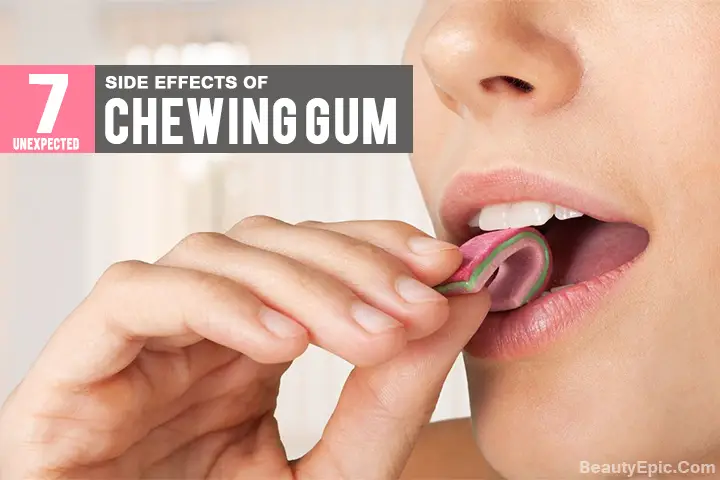
Important: This article is for informational purposes only. Please read our full disclaimer for more details.
We know what you are thinking chewing gum seems harmless, but chewing gum can be quite harmful not only to your teeth but to your overall health. Chewing gum is common and every one of us does it for different reasons. Chewing gum may help some of us to focus, relax or get rid of that bad breath. So, the question remains to chew gum or not to chew gum? Here is a list of side effects of chewing gum which will answer this question and help you decide if you want to continue with this habit or not.
[ Read: How to Use Baking Soda for Bad Breath? ]
Unexpected Side Effects Of Chewing Gum
1. Binge Eating
Many of us actually chew gum so we can avoid snacking on unhealthy junk foods. However, the opposite happens. Even though the people who chew gum have a reduced motivation to eat foods, the things they end up eating tend to be less healthy. They tend to reach for potato chips and other forms of candy after they are done with their stick of gum rather than snacking on fruits. This causes binge eating and can lead to various lifestyle disorders.(1)
2. Tooth Damage
Gum usually contains sugar or artificial sweeteners, which allows coating your teeth with sugar while you chew the gum leading to plaque buildup and tooth decay. Even artificial sweeteners added in these gums to taste good are quite harmful as they consist of artificial flavors and preservatives which cause the teeth to slowly dissolve.(2)
3. Problems
Chewing gum leads to stress in your stomach and intestines. You need to give time to your stomach to rest and be able to digest the food, but if you keep chewing gum consistently you are swallowing an excessive amount of spit, not allowing your body to properly digest the foods. Chewing also signals your body that you are about to swallow food, so the acids that are used in the digestion of food are activated, causing all sorts of problems in your stomach. This can make your body bloated, over-production of stomach-acid and further lessening your ability to digest food when you are actually eating.
The artificial sweeteners in the gum can lead to diarrhea and other gastrointestinal problems.
4. Headache
Chewing gum on a regular basis has been linked to headaches. When one consumes a chewing gum, the physical movement of the teeth and jaw goes up by 40% which if continued for a longer span of time can cause splitting headache, that can be very painful.(3)
5. Increased Chances of TMJ
TMJ i.e. Temporomandibular Joint Disorder, chewing gum puts excessive amounts of stress on your jaw which can cause jaw muscle imbalance. This is a painful chronic condition. At any point in time, if you tend to overuse a certain set of muscles it leads to contracted muscles and related pain. Over time, TMJ can lead to headaches, toothaches, earaches and migraines in a lot of cases.(4)
6. Lanolin Allergies
Lanolin is the ingredient which keeps chewing the gum soft. This ingredient is also found in skin care products. It is just as bad as it sounds; it is a yellow waxy substance which is secreted by the sebaceous glands of the sheep. Although the quality found in gum is hardly threatening to one’s health but at times it can cause allergies among a few individuals. Hence it is better to avoid.
7. Neurological Disorders
Amalgam dental fillings or silver fillings consist of a combination of mercury, tin and silver. Chewing gum can release the mercury from these fillings into your system. High levels of mercury in your system can cause neurological issues as well as chronic illnesses and mental disorders.
So does this mean we have to give up chewing gum for good? Not at all. Just remember to use it correctly. Chew gum for 10 minutes after a meal but not any longer than that. If you find any of the above mentioned side effects affecting you, first and foremost would be to look out for medical help to curb the problem.
You Might Also Like:
- Top 6 Surprising Baking Soda Side Effects
- 11 Unexpected Side Effects Of Peppermint Tea
- 6 Amazing Health Benefits of Baking Soda and Lemon Juice
- Baking Soda and Lemon: Benefits for Health and Beauty
- 14 Surprising Beauty Benefits of Baking Soda You Must Know!
- Benefits of Baking Soda for Face: How To Use?
Image:- 1















